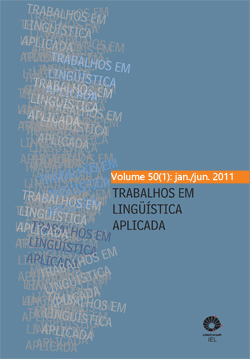Abstract
A hilária trama de Les nègres du traducteur, romance de Claude Bleton publicado na França em 2004, permite-nos explorar as relações que tradutores estabelecem com seus autores e originais. O texto de Bleton é particularmente útil para uma discussão de algumas noções relacionadas a teorias contemporâneas do texto e da tradução que giram em torno da noção nietzschiana de “morte do autor”. Aaron Janvier, narrador e protagonista de Bleton, é um escritor frustrado que consegue se transformar em um importante tradutor de romances espanhóis para o francês, cujo gosto pelas estratégias domesticadoras de tradução faz dele uma figura poderosa nos círculos editoriais de Paris, Madri e Barcelona. À medida que conquista mais e mais influência no mundo editorial, Janvier não hesita em transformar os autores que traduz em seus “nègres”, ou seja, em ghostwriters encarregados de escrever os “originais” que devem ser estritamente fiéis às “traduções” que ele lhes envia. Quando alguns dos autores começam a questionar essa situação peculiar, Janvier os elimina sumariamente. Por meio de um exame detalhado da caracterização que Bleton faz do tradutor como um assassino, este artigo propõe uma reconsideração de alguns clichês que estão associados ao tradutor, ao seu trabalho e à suposta impropriedade de sua íntima relação com textos e autores
ABSTRACT
The hilarious plot of Claude Bleton’s novel, Les nègres du traducteur, published in France in 2004, allows us to explore the relationships that translators are often perceived to establish with their authors and originals. Bleton’s text is particularly helpful for a discussion of some notions that are usually related to contemporary theories of text and translation that revolve around the post-Nietzschean notion of the “death of the author”. Aaron Janvier, Bleton’s narrator and protagonist, is a frustrated writer who manages to become a prominent translator of Spanish novels into French, and whose taste for domesticating translation strategies turns him into a powerful figure in the publishing circles of Paris, Madrid and Barcelona. As Janvier gets increasingly influential in the publishing world, he does not hesitate to turn the authors he should be translating into his “nègres”, that is, into ghostwriters who are in charge of writing the “originals” that are expected to be strictly faithful to the “translations” he sends them. When some of his authors begin to reconsider their peculiar arrangement, Janvier simply kills them off. Through a close examination of Bleton’s characterization of the translator as killer, this essay proposes to rethink some recurrent clichés associated with translators, their craft, and the alleged impropriety of their close relationship with texts and authors.
keywords: translation, impropriety, Claude Bleton, Les nègres du traducteur
References
ARROJO, R. (1995). The ‘death’ of the author and the limits of the translator’s visibility.
In: Snell Hornby, M.; Jettmarová, Z.; Kaindl, K. (eds.) Translation as intercultural communication. New York and Amsterdam: John Benjamins, p. 21-32.
_____. (2002). “Writing, interpreting, and the power struggle for the control of meaning: Scenes from Kafka, Borges, and Kosztolanyi. In: Tymoczko, M.; Gentzler, E. (eds.).
Translation and power. Amherst: The University of Massachusetts Press, p. 67-79.
_____. (2005). The gendering of translation in fiction: translators, authors, and women/texts in Scliar and Calvino. In: Santaemilia, J. (ed.) Gender, sex and translation. Manchester: St. Jerome, pp. 81-95.
_____. (2006). Translation, transference, and the attraction to otherness - Borges, Menard, Whitman. Diacritics 34(3), pp. 31-52 BARTHES, R. (1979). From work to text. In: Harari, J. V. (ed.) Textual strategies: perspectives in Post-Structuralist criticism. Ithaca: Cornell University Press, pp. 73-81.
BLANCHOT, M. (1997). Translating. In: Friendship, trad. Elizabeth Rottenberg. Stanford: Stanford University Press, pp.57-61.
BLETON, C. (2004). Los negros del traductor, trad. M. T. Gallegos, A. Ehrehnaus, M. Sáenz; J.
Zulaika. Madrid: Editorial Funambulista.
BORGES, J. L. (2002). Pierre Menard, author of the Quixote. In: Collected Fictions, trad.
Andrew Hurley. New York: Penguin Books, pp. 88-95.
CHAMBERLAIN, L. (2004). Gender and the metaphorics of translation. In: Venuti, L. (ed).
Translation Studies Reader. New York: Routledge, pp. 314-329.
FOUCAULT, M. (1979). What Is an Author? In: Harari, J. V. (ed.) Textual strategies: perspectives in Post-Structuralist criticism. Ithaca: Cornell University Press, pp.141-159.
ROBINSON, D. (ed.) (1997). Western translation theory: from Herodotus to Nietzsche Manchester: St. Jerome Publishing.
SALAMA-CARR, M.. (1998). French Tradition. In: Baker, M. (ed.), Routledge Encyclopedia of Translation Studies. New York: Routledge, 411-413.
SPIVAK, G. (2004). The politics of translation. In: Venuti, L. (ed.). Translation studies reader.
New York: Routledge, 397-416.
VENUTI, L. (1995). The translator’s invisibility - A history of translation. New York: Routledge.
O periódico Trabalhos em Linguística Aplicada utiliza a licença do Creative Commons (CC), preservando assim, a integridade dos artigos em ambiente de acesso aberto, em que:
- A publicação se reserva o direito de efetuar, nos originais, alterações de ordem normativa, ortográfica e gramatical, com vistas a manter o padrão culto da língua, respeitando, porém, o estilo dos autores;
- Os originais não serão devolvidos aos autores;
- Os autores mantêm os direitos totais sobre seus trabalhos publicados na Trabalhos de Linguística Aplicada, ficando sua reimpressão total ou parcial, depósito ou republicação sujeita à indicação de primeira publicação na revista, por meio da licença CC-BY;
- Deve ser consignada a fonte de publicação original;
- As opiniões emitidas pelos autores dos artigos são de sua exclusiva responsabilidade.

